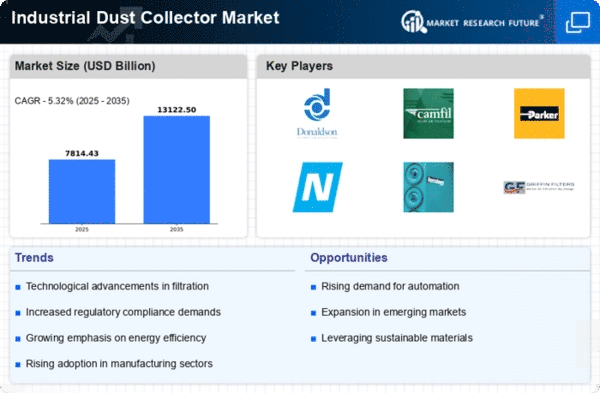Top Industry Leaders in the Industrial Dust Collector Market

*Disclaimer: List of key companies in no particular order
Top listed global companies in the industry are:
- KASTO
- HE&M Inc.
- Cosen Saws
- DoAll Sawing Products
- MetlSaw Sawing Solutions
- Behringer
- Amada
- Marvel
- Hyd-Mech, and others.
Dust in the Wind: Navigating the Competitive Landscape of the Industrial Dust Collector Market
The global industrial dust collector market is a fiercely competitive arena where players battle to control airborne particles. Understanding the strategies deployed to filter out the competition, the factors influencing market share, and emerging trends is crucial for navigating this dust-filled landscape.
Key Players and their Strategies:
- Global Giants: Industrial titans like Nederman and ** Donaldson** leverage their extensive product portfolios, global reach, and brand recognition to command a significant market share. Nederman offers diverse dust collectors across industries, while Donaldson excels in high-performance filtration technologies.
- Regional Champions: Companies like Aerex and Euro Filter dominate specific geographies by tailoring solutions to regional regulations and industry needs. Aerex caters to North America's stringent environmental standards, while Euro Filter excels in cost-effective solutions for Europe's smaller manufacturers.
- Technology Trailblazers: Startups like Camfil APC and Ceko disrupt the market with innovative approaches. Camfil APC focuses on energy-efficient and sustainable collector designs, while Ceko pushes the boundaries with smart, self-cleaning dust collector systems.
Factors for Market Share Analysis:
- Product Breadth and Depth: Offering a range of dust collectors for diverse applications (woodworking, metals, chemicals) and dust types (fine, explosive) caters to varied customer needs and expands market reach.
- Technological Innovation: Integrating advanced features like automated pulse-jet cleaning, high-efficiency filters, and digital monitoring enhances dust capture efficiency, energy consumption, and operator safety. Ceko's smart dust collectors illustrate this.
- Cost-Effectiveness and ROI: Balancing advanced features with affordability is crucial, especially in price-sensitive segments. Euro Filter's cost-effective solutions have secured a strong foothold in emerging markets.
- Compliance and Certifications: Adherence to stringent air quality regulations and industry standards like OSHA and ATEX is mandatory for market access and customer trust. Donaldson's extensive certifications exemplify this focus.
Emerging Trends and Company Strategies:
- Smart Dust Collectors: Integrating sensors, communication modules, and AI into dust collectors enables real-time performance monitoring, predictive maintenance, and data-driven optimization. Ceko's smart dust collectors exemplify this trend.
- Focus on Sustainability: Developing dust collectors with lower energy consumption, recyclable materials, and minimized waste generation is gaining traction. Camfil APC's energy-efficient designs cater to this growing demand.
- Compact and Modular Systems: Offering compact and modular dust collectors with easy installation and integration into space-constrained applications is gaining traction. Nederman's modular systems exemplify this approach.
- Industry-Specific Solutions: Tailoring dust collectors to specific industries like pharmaceuticals and food processing with specialized features and certifications attracts targeted customer segments. Donaldson's solutions for the food industry illustrate this approach.
Overall Competitive Scenario:
The industrial dust collector market presents a dynamic landscape where established giants face challenges from regional specialists and technology-driven startups. Success hinges on offering diverse and technologically advanced collectors, balancing affordability with innovation, prioritizing compliance and safety, and adapting to emerging trends like smart technologies, sustainability, and modularity. Companies demonstrating agility, industry expertise, and a commitment to clean air solutions hold a strong hand in navigating this competitive and ever-evolving market.
Latest Company Updates:
March 2023- Rotzinger PharmaPack, a subsidiary of Rotzinger Group, has launched US offices in York, PA. The move for the German company aims to strengthen its partnerships with customers in America. Oscar Roth, CEO at Rotzinger Group, said that the decision to expand to the US and open their first site here was a logical step. The company wants to support its customers personally, and that requires being close to them. Rotzinger PharmaPack offers expertise in pharmaceutical and cosmetics packaging. Its core business is solutions for packaging and cartoning solid and liquid end products, as well as track-and-trace solutions for serialization and aggregation.
Additionally, Rotzinger Pharmapack develops applications for filling and capping pharmaceutical products and unscrambling machinery for bottles and other containers. The company covers a wide range of packaging solutions, such as bottles, vials, ampoules, jars, syringes, auto-injectors, pouches, and blisters. The roots of Rotzinger PharmaPack go back to 1861 when the company Geiger & Hesser was founded. It is widely considered the cradle of German packaging machine construction with its 1911 invention of the first coffee packaging machine. In 1945, the company Höfliger + Karg was founded and launched the first capsule-filling machine to the market in 1958. The company later became Bosch Packaging Technologies, and throughout the years, the corporation became a leading manufacturer of packaging technology in Europe. In 2020, Bosch was relaunched as Syntegon. From this, Rotzinger Group took over the Syntegon Cartoning – Track & Trace GmbH and renamed it Rotzinger PharmaPack GmbH.










